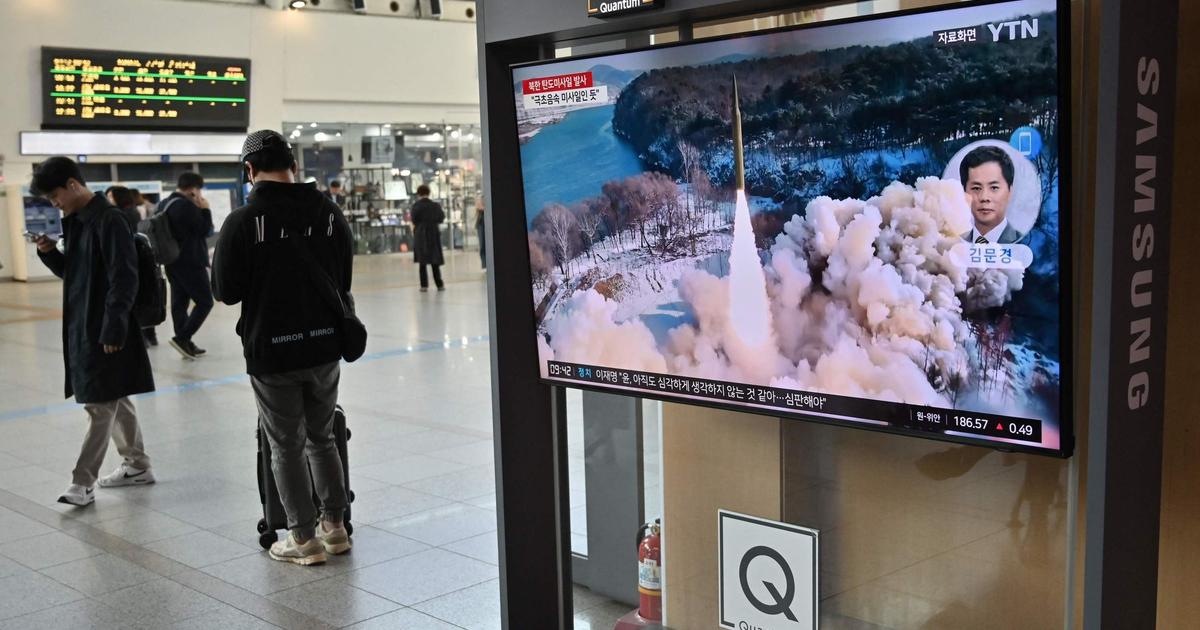The bad old days are back.
Those of 2017, in which North Korea carried out missile tests at an almost weekly rate.
This Monday, the Pyongyang regime has fired what appear to be two new short-range ballistic missiles from around the capital's Sunan airport, the fourth launch so far this year and with which it seeks -like the first three- develop their new weapons technologies and increase pressure on the United States.
The two projectiles, fired shortly before 09:00 Korean time (01:00 Spanish peninsular time) just three days after another double launch - the one carried out from a train - had a journey of about 380 kilometers and reached a height of about 42 kilometers in a flight in a northeasterly direction, before falling into the sea, according to the South Korean General Staff.
The Japanese Ministry of Defense, for its part, has calculated that the missiles traveled a distance of 300 kilometers and reached a height of 50 kilometers on a "normal ballistic trajectory".
The Blue House, the seat of the South Korean presidency, called the new launch "very regrettable" and called an emergency meeting of its national security council in Seoul.
North Korea has carried out three more missile tests since the start of the year, a pace not seen since the worst of 2017, when tensions with the United States threatened to spark violent conflict.
But in November of that year North Korean Supreme Leader Kim Jong Un declared his country's nuclear weapons program complete.
In 2018, a thawing process was opened with Seoul and a stage of negotiations began with the United States, within which Pyongyang declared a moratorium on its launches.
The series of summits that Kim held with then US President Donald Trump ran into a resounding failure in Hanoi in February 2019. Since then the process has languished, without the new Joe Biden Administration having shown great signs of interest in resuming it.
With no signs of recovery from the negotiations, the North Korean supreme leader gave orders last year to develop new high-tech weapons, a priority that was included in the new five-year plan (2021-2015). In September last year, Pyongyang carried out its first test of a hypersonic missile, a technology that until now only the United States, Russia and China have and that allows rockets to reach speeds five times faster than the speed of sound and can maneuver in its trajectory after the shot. The first two launches this year have also been of hypersonic missiles, according to North Korean state media. Seoul assures that it is still very rudimentary technology and that its anti-missile systems are capable of neutralizing these rockets if they were fired at its territory.
The third launch so far this year came on Friday, two short-range missiles fired from a train near the Chinese border. That evidence came a day after Washington imposed new sanctions against North Korean officials implicated in that country's weapons program. A few hours before the shooting, North Korea had threatened a "stronger" response to these punishments, which it considered a "provocation".
The new series of tests, either from a train or hypersonic missiles, indicates that North Korea "seeks to improve its technology and operational capabilities to carry out secret launches, so that other countries have problems detecting the signs that a shot is being prepared," Japanese Defense Minister Nobuo Kishi told a news conference. "The remarkable development of North Korea's missile technology cannot be ignored, for the sake of the security of Japan and the rest of the region," he added.
The frantic new push for weapons technology comes as Kim himself has acknowledged food supply difficulties caused by a combination of international sanctions, weather disasters and the hermetic closure of borders to protect the impoverished nation from covid. .
Precisely, this weekend a North Korean freight train crossed the border over the Yalu River and entered China, according to the South Korean agency Yonhap, in what could mean the reactivation of trade between North Korea and its giant neighbor, from where 90% of the products imported by the Pyongyang regime came from.
Follow all the international information on
and
, or in
our weekly newsletter
.

/cloudfront-eu-central-1.images.arcpublishing.com/prisa/RR3KVFTBN3QOUVVVH56GLHM47Y.jpg)






